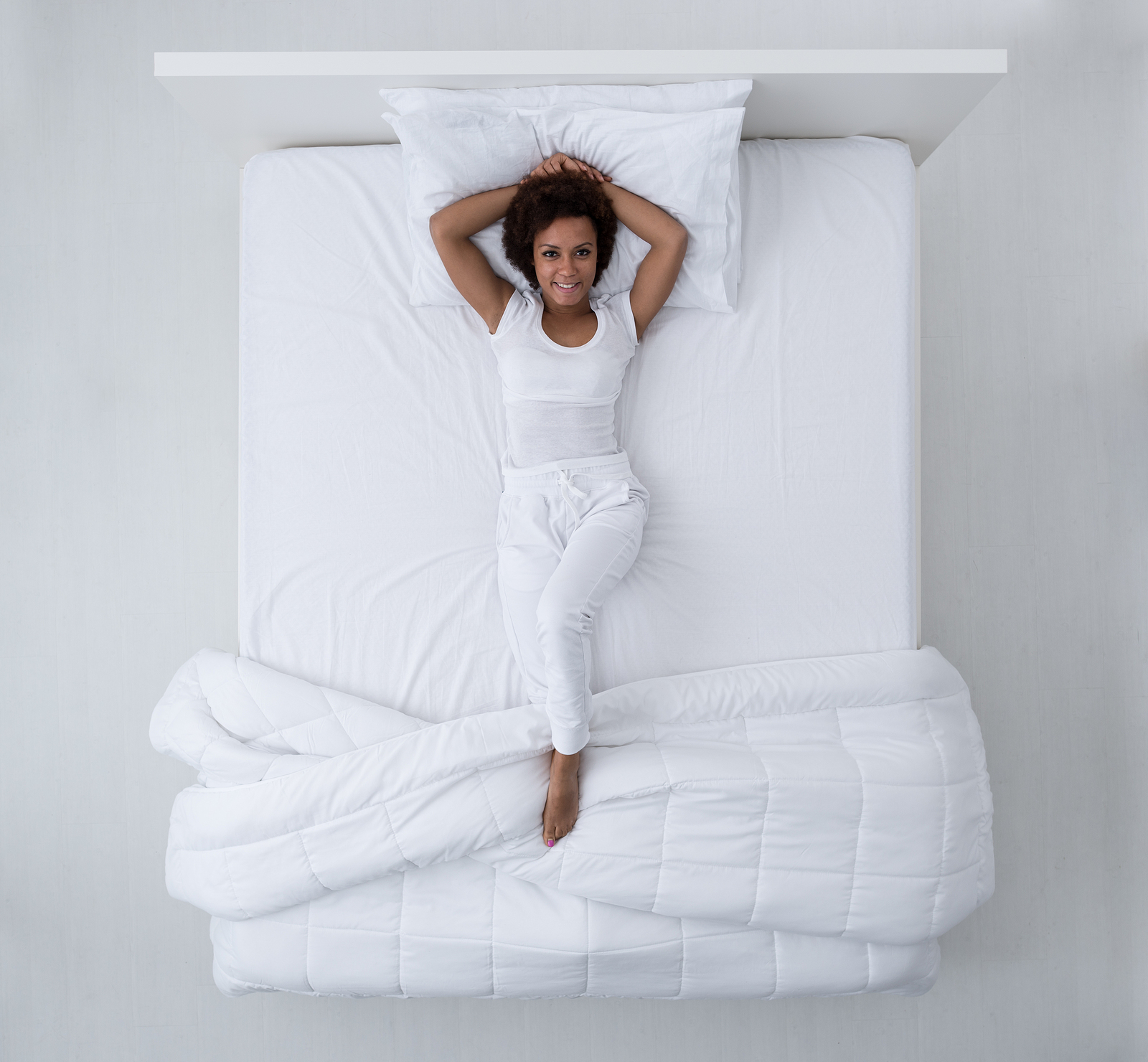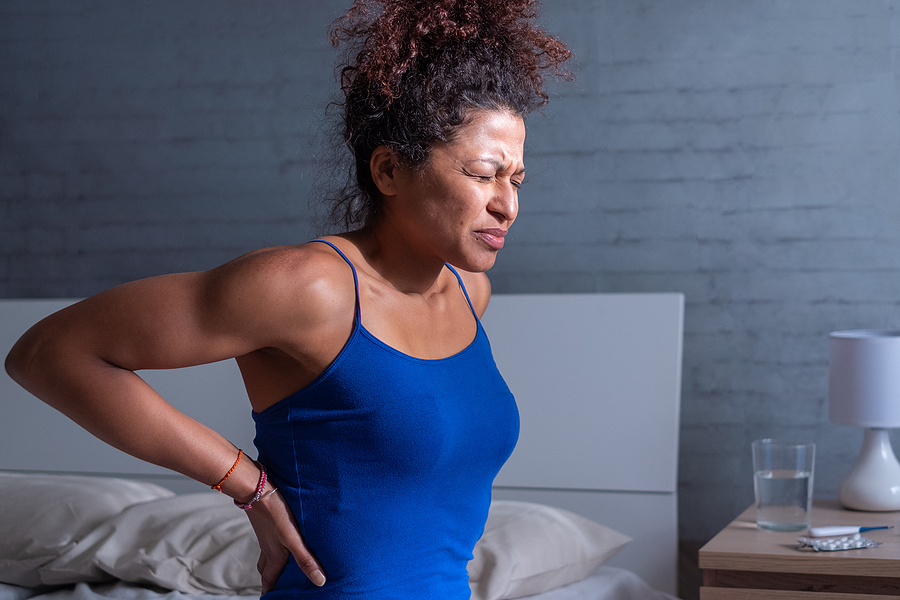
October 22, 2021 l by Tara E.
Fall Asleep Better and Faster
How can I sleep better at night? How can I fall asleep faster? You likely have asked yourself these questions and more at night as you lay in your bed staring up at the ceiling. Unfortunately, the path to restful sleep can be difficult for some people for a variety of reasons. Multiple studies report that the prevalence of insomnia exists in 10%-30% of the worldwide population and as high as 50%-60% in segments. Poor sleep patterns can contribute to a variety of problems if left unmanaged. Depression, motor vehicle accidents, and poor work performance are all associated with poor sleep experiences (1).
Are you looking to improve your sleep experience? There are a few things that you can do to improve the quality and quantity of sleep that you get.
No Caffeine Before Bedtime
The answer to how to sleep better may rest with your beverage choices. Caffeine is a potent stimulant that can have detrimental effects on the quality of sleep you get. It is a mainstay ingredient in many beverages, including coffee, tea, soda, and energy drinks. Not only can nighttime caffeine consumption affect your sleep experience by delaying its onset, but the quantity of caffeine that you consume during the daytime hours can also have a direct impact on your ability to fall asleep. Additionally, it may leave you feeling tired in the morning. Ironically, it is that morning sense of exhaustion that triggers you to repeat the cycle all over again, enticing you to boost your intake of caffeine to get that oh-so-necessary adrenaline rush in the morning (2).
Keep Noise to a Minimum
The Sleep Foundation suggests that noise can lead to episodes of fragmented sleep, excess adrenaline, and cortisol hormone production and may significantly affect our health (3).
Remove or decrease the amount of noise in your environment. For example, do you like to fall asleep with the television on? Beware that you may not be getting the kind of sleep you need to be well-rested. Experts say that soft music may be okay if it aids in sleep, but be wary of loud noises. If you live in a noisy area, consider investing in noise-canceling earplugs or Sleep Headphones. Sleep Masks for Side Sleepers can help you block out unwanted noise. Multiple sleep headphones on the market can also provide you with relaxing sounds designed to guide your body into a restful sleep.
Buy A New Mattress for Better Sleep
What is the relationship between sleep and a mattress? Yes, of course, you lie on the bed to find rest each night, but is your mattress proving to be an obstacle? It is recommended that you replace your mattress as early as six years post-purchase and up to ten years. If your mattress has surpassed this recommendation, it may be time for you to ditch that old mattress and invest in a new one.
Lumpy spots, deep sags, and creaky springs or sounds are clear signs it’s time to make a trip to the local mattress store or begin surfing the net. Inexplicable allergies and backaches may be your body’s way of physically protesting your decision to keep crawling into bed night after night. Do you need a firm bed or a softer mattress? It’s up to you to figure out which one will allow you to rest the easiest.
Another consideration to keep in mind is whether you have the best pillow for sleep. A good pillow adequately supports your neck and spine. Believe it or not, the curve of your spine is essential to your comfort. Therefore, the shape of your pillow and the content (i.e., memory foam or feathers) play a vital role in your sleep quality (4). Also, studies show that your pillow should reduce your core and head temperature while you sleep. Therefore, it is crucial for deep sleep (4).

How often should you replace your pillows? Experts agree that it is ideal for you to replace your pillows every one to two years.
Consumers are touting the following pillows as their top picks:
Take Control of Your Stress Before You Go to Bed
Finally, take stock of your mental wellness, focusing on stressful aspects of your life that may be keeping you awake at night. Many people underestimate the importance of stress management, but you should not ignore the effects it can have on the quality of your sleep. Try to limit your stress level at bedtime. Is there something on your mind? Write it down so that you can address it in the morning and forget about it at night.
Do you need to talk with someone? Talk to a family member, friend, significant other, or professional. Your ultimate goal should be to tackle this issue as soon as possible so that you can get back to catching some zzz’s.
In closing, the power of getting a good night’s rest is back in your hands. Try some of these tips, and do not be afraid to do a bit of troubleshooting yourself.
References
1. Bhaskar, S., Hemavathy, D., & Prasad, S. (2016). Prevalence of chronic insomnia in adult patients and its correlation with medical comorbidities. Journal of family medicine and primary care, 5(4), 780–784. https://doi.org/10.4103/2249-4863.201153
2. O’Callaghan, F., Muurlink, O., & Reid, N. (2018). Effects of caffeine on sleep quality and daytime functioning. Risk management and healthcare policy, 11, 263–271. https://doi.org/10.2147/RMHP.S156404
3. Fry, A (2021). How Noise Can Affect Your Sleep Satisfaction. Retrieved from https://www.sleepfoundation.org/noise-and-sleep
4. Jeon, M. Y., Jeong, H., Lee, S., Choi, W., Park, J. H., Tak, S. J., Choi, D. H., & Yim, J. (2014). Improving the quality of sleep with an optimal pillow: a randomized, comparative study. The Tohoku journal of experimental medicine, 233(3), 183–188. https://doi.org/10.1620/tjem.233.183